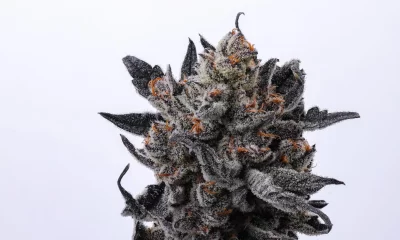Business
Zimbabwe OKs First Medicinal Cannabis Sales

Zimbabwe is looking to shift away from tobacco, and views cannabis as its next cash crop.
The Medicines Control Authority of Zimbabwe said on Tuesday that it is now accepting applicants from cannabis and hemp producers, manufacturers, importers, exporters, and retail pharmacists, the latest move by the southern African country to shift away from tobacco.
As Bloomberg reported, cannabis will be offered as “complimentary medicines given to patients,” marking the “first time” that Zimbabwe has permitted cannabis to be sold.
The authority spelled out a host of conditions for applicants, advising that they must submit both product samples and “certificates of analysis from an accredited laboratory specifying the quantities of the active moieties of cannabidiols and any traces of tetrahydrocannabinols as part of the information in the dossier.”
“Any Hemp-based CBD product applications that do not meet the criteria above may not be approved for distribution, and will be confiscated,” the Medicines Control Authority warned. “Further, sellers may be prosecuted for selling unapproved complementary medicines.”
Zimbabwe legalized medical cannabis in 2018, making it among the first countries in Africa to do so.
The policy was motivated by economic realities. Long the country’s leading export, tobacco sales have fallen worldwide, forcing farmers and lawmakers in Zimbabwe to rethink its approach to agriculture.
Zimbabwe brought in $819 million in revenue from tobacco last year, according to Bloomberg, although the expected “demand for cannabis is projected to continue to grow while tobacco [the country’s] output globally may decline 15% by 2030.”
Industry leaders have encouraged the country’s tobacco farmers “to plant cannabis so that a quarter of their income comes from the plant by 2025,” Bloomberg reported.
In 2019, Zimbabwe abolished its ban on cannabis cultivation, which set the stage for the country’s farmers to begin cultivating industrial hemp to export. That same year, the country issued the first license to a medical cannabis company to begin cultivation.
Last year, according to Bloomberg, Zimbabwe “exported 30 tons of industrial hemp to Switzerland last year, its first foray into the European market.”
In May, Zimbabwean President Emmerson Mnangagwa commissioned a $27 million medical cannabis farm and processing plant to be run by Swiss Bioceuticals Limited in West Province, Zimbabwe.
“This milestone is a testimony of the successes of my Government’s Engagement and Re-engagement Policy. It further demonstrates the confidence that Swiss companies have in our economy through their continued investment in Zimbabwe. I extend my profound congratulations to the Swiss Bioceuticals Limited for this timely investment in the medicinal cannabis farm, processing plant and value chain, worth US$27 million,” Mnangagwa said in the announcement of the plant, as quoted by Business Insider.
Mnangagwa has been a vocal booster of the country’s medical cannabis program, often saying that Zimbabwe is “open for business” to the industry.
Business Insider reported at the time that Mnangagwa “also urged other investors with permits to quickly operationalize their permits and licenses for the benefit of the economy in general and people in particular.”
“I challenge other players within the medicinal cannabis sub-sector to speedily set up their enterprises, focusing on value addition and beneficiation. It is disappointing that since 2018, only 15 out of the 57 entities issued with cannabis operating [licenses] have been operational,” Mnangagwa said, as quoted by Business Insider.
Mnangagwa urged investors to “follow [Swiss Bioceuticals Limited’s] lead and open their business to support the mantra that ‘Zimbabwe is Open for Business’ and be ready to generate foreign currency generation for the country.”
With experts forecasting the global cannabis industry to be worth $272 billion by 2028, Reuters reported that Zimbabwean officials have said “the country wants at least $1 billion of that — more than it currently makes from its top agricultural export tobacco.”
Source: https://hightimes.com/news/zimbabwe-oks-first-medicinal-cannabis-sales/
Business
New Mexico cannabis operator fined, loses license for alleged BioTrack fraud

New Mexico regulators fined a cannabis operator nearly $300,000 and revoked its license after the company allegedly created fake reports in the state’s traceability software.
The New Mexico Cannabis Control Division (CCD) accused marijuana manufacturer and retailer Golden Roots of 11 violations, according to Albuquerque Business First.
Golden Roots operates the The Cannabis Revolution Dispensary.
The majority of the violations are related to the Albuquerque company’s improper use of BioTrack, which has been New Mexico’s track-and-trace vendor since 2015.
The CCD alleges Golden Roots reported marijuana production only two months after it had received its vertically integrated license, according to Albuquerque Business First.
Because cannabis takes longer than two months to be cultivated, the CCD was suspicious of the report.
After inspecting the company’s premises, the CCD alleged Golden Roots reported cultivation, transportation and sales in BioTrack but wasn’t able to provide officers who inspected the site evidence that the operator was cultivating cannabis.
In April, the CCD revoked Golden Roots’ license and issued a $10,000 fine, according to the news outlet.
The company requested a hearing, which the regulator scheduled for Sept. 1.
At the hearing, the CCD testified that the company’s dried-cannabis weights in BioTrack were suspicious because they didn’t seem to accurately reflect how much weight marijuana loses as it dries.
Company employees also poorly accounted for why they were making adjustments in the system of up to 24 pounds of cannabis, making comments such as “bad” or “mistake” in the software, Albuquerque Business First reported.
Golden Roots was fined $298,972.05 – the amount regulators allege the company made selling products that weren’t properly accounted for in BioTrack.
The CCD has been cracking down on cannabis operators accused of selling products procured from out-of-state or not grown legally:
- Regulators alleged in August that Albuquerque dispensary Sawmill Sweet Leaf sold out-of-state products and didn’t have a license for extraction.
- Paradise Exotics Distro lost its license in July after regulators alleged the company sold products made in California.
Golden Roots was the first alleged rulebreaker in New Mexico to be asked to pay a large fine.
Source: https://mjbizdaily.com/new-mexico-cannabis-operator-fined-loses-license-for-alleged-biotrack-fraud/
Business
Marijuana companies suing US attorney general in federal prohibition challenge

Four marijuana companies, including a multistate operator, have filed a lawsuit against U.S. Attorney General Merrick Garland in which they allege the federal MJ prohibition under the Controlled Substances Act is no longer constitutional.
According to the complaint, filed Thursday in U.S. District Court in Massachusetts, retailer Canna Provisions, Treevit delivery service CEO Gyasi Sellers, cultivator Wiseacre Farm and MSO Verano Holdings Corp. are all harmed by “the federal government’s unconstitutional ban on cultivating, manufacturing, distributing, or possessing intrastate marijuana.”
Verano is headquartered in Chicago but has operations in Massachusetts; the other three operators are based in Massachusetts.
The lawsuit seeks a ruling that the “Controlled Substances Act is unconstitutional as applied to the intrastate cultivation, manufacture, possession, and distribution of marijuana pursuant to state law.”
The companies want the case to go before the U.S. Supreme Court.
They hired prominent law firm Boies Schiller Flexner to represent them.
The New York-based firm’s principal is David Boies, whose former clients include Microsoft, former presidential candidate Al Gore and Elizabeth Holmes’ disgraced startup Theranos.
Similar challenges to the federal Controlled Substances Act (CSA) have failed.
One such challenge led to a landmark Supreme Court decision in 2005.
In Gonzalez vs. Raich, the highest court in the United States ruled in a 6-3 decision that the commerce clause of the U.S. Constitution gave Congress the power to outlaw marijuana federally, even though state laws allow the cultivation and sale of cannabis.
In the 18 years since that ruling, 23 states and the District of Columbia have legalized adult-use marijuana and the federal government has allowed a multibillion-dollar cannabis industry to thrive.
Since both Congress and the U.S. Department of Justice, currently headed by Garland, have declined to intervene in state-licensed marijuana markets, the key facts that led to the Supreme Court’s 2005 ruling “no longer apply,” Boies said in a statement Thursday.
“The Supreme Court has since made clear that the federal government lacks the authority to regulate purely intrastate commerce,” Boies said.
“Moreover, the facts on which those precedents are based are no longer true.”
Verano President Darren Weiss said in a statement the company is “prepared to bring this case all the way to the Supreme Court in order to align federal law with how Congress has acted for years.”
While the Biden administration’s push to reschedule marijuana would help solve marijuana operators’ federal tax woes, neither rescheduling nor modest Congressional reforms such as the SAFER Banking Act “solve the fundamental issue,” Weiss added.
“The application of the CSA to lawful state-run cannabis business is an unconstitutional overreach on state sovereignty that has led to decades of harm, failed businesses, lost jobs, and unsafe working conditions.”
Business
Alabama to make another attempt Dec. 1 to award medical cannabis licenses

Alabama regulators are targeting Dec. 1 to award the first batch of medical cannabis business licenses after the agency’s first two attempts were scrapped because of scoring errors and litigation.
The first licenses will be awarded to individual cultivators, delivery providers, processors, dispensaries and state testing labs, according to the Alabama Medical Cannabis Commission (AMCC).
Then, on Dec. 12, the AMCC will award licenses for vertically integrated operations, a designation set primarily for multistate operators.
Licenses are expected to be handed out 28 days after they have been awarded, so MMJ production could begin in early January, according to the Alabama Daily News.
That means MMJ products could be available for patients around early March, an AMCC spokesperson told the media outlet.
Regulators initially awarded 21 business licenses in June, only to void them after applicants alleged inconsistencies with how the applications were scored.
Then, in August, the state awarded 24 different licenses – 19 went to June recipients – only to reverse themselves again and scratch those licenses after spurned applicants filed lawsuits.
A state judge dismissed a lawsuit filed by Chicago-based MSO Verano Holdings Corp., but another lawsuit is pending.
Source: https://mjbizdaily.com/alabama-plans-to-award-medical-cannabis-licenses-dec-1/
-

 Business2 years ago
Business2 years agoPot Odor Does Not Justify Probable Cause for Vehicle Searches, Minnesota Court Affirms
-

 Business2 years ago
Business2 years agoNew Mexico cannabis operator fined, loses license for alleged BioTrack fraud
-

 Business2 years ago
Business2 years agoAlabama to make another attempt Dec. 1 to award medical cannabis licenses
-

 Business2 years ago
Business2 years agoWashington State Pays Out $9.4 Million in Refunds Relating to Drug Convictions
-

 Business2 years ago
Business2 years agoMarijuana companies suing US attorney general in federal prohibition challenge
-

 Business2 years ago
Business2 years agoLegal Marijuana Handed A Nothing Burger From NY State
-

 Business2 years ago
Business2 years agoCan Cannabis Help Seasonal Depression
-

 Blogs2 years ago
Blogs2 years agoCannabis Art Is Flourishing On Etsy













